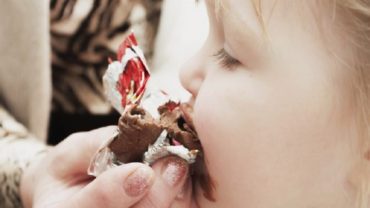via Livestrong.com: In general, babies less than 1 year old should avoid chocolate, particularly, dark and milk chocolate. These contain caffeine-like substances. Caffeine is unsuitable for very small children because of its stimulating effect. As children reach a year old, they can tolerate small amounts of white chocolate, which contains less caffeine. However, even in this case, the high sugar content makes it far from ideal as a baby snack.
Digestion
Babies are designed to take in breast milk or formula for the first four to six months of life. A baby’s digestive system can’t handle solid foods, including chocolate, for up to six months. You may find that even after that, it takes several months to wean your baby onto mashed solids. Babies generally start out on wet cereal and move to pureed vegetables and eventually to pureed meats and mashed foods. This process may last another six months and more. Chocolate doesn’t feature as a recommended stage in introducing your baby to solid foods.
Caffeine
Though no evidence appears to link moderate caffeine consumption in children with serious long-term complications, you should avoid giving caffeine products to babies. At less than 1 year old, their systems are still very sensitive. A small amount of caffeine to an adult can be a large dose for a baby. This amount can stimulate a baby and make him feel alert and uncomfortable. It might even throw off sleeping and feeding routines. A teaspoon of milk chocolate contains around 1 milligram of caffeine. A teaspoon of dark chocolate contains around 4 milligrams on average. Children less than 2 years old should ideally avoid all caffeine.
Tooth Decay
Though babies less than 1 year old have only small developing teeth, these are vulnerable to tooth decay. Sugar rapidly speeds up tooth decay because it provides a food source for acid-producing mouth bacteria. Cleaning your baby’s teeth may be difficult, so sometime the acids build up around teeth. Chocolate usually contains a lot of sugar. Giving your infant chocolate may result in some tooth problems or poor oral health.
Considerations
Chocolate contains many calories for little nutritional benefit. Getting your baby used to high-sugar foods can lead to problems such as obesity later in life. Some babies even show allergic reactions to chocolate, according to the USDA’s Nutrition Assistance Program. If you notice excessive sickness or light diarrhea after giving your child chocolate, avoid offering her any more. If she develops a fever, rash or severe symptoms, take her to a doctor immediately.


